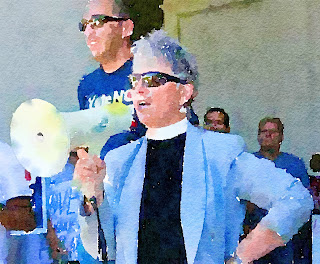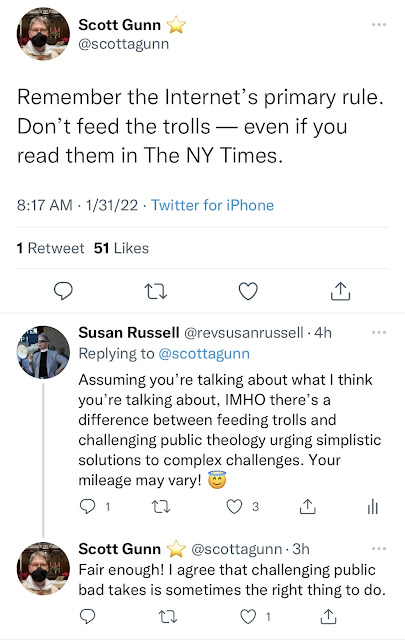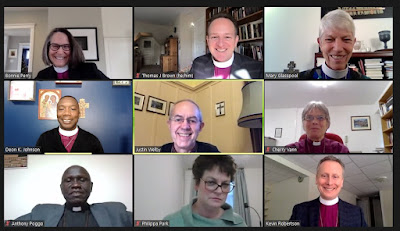It was the Second Sunday of Christmas and the first Sunday after the passing of the inimitable Archbishop Desmond Tutu. The Omicron surge had driven us back to live-stream-only worship at All Saints Church in Pasadena ... and we added this excerpt from one of Archbishop Tutu's sermons to the lessons read at our 9:00 & 11:30 services.
And I got to preach.
It was quite a way to kick off 2022.
A Reading from Archbishop Desmond Tutu
You are family. You are the human family, God’s family.
You and I, knowing ourselves to be the sinners that we are,
are given the incredible privilege of addressing God –
the all holy God, the omnipotent God,
the God who dwells in light unapproachable,
from whom the angels and archangels veil their sight,
as they worship and adore God ceaselessly,
crying “Holy, holy, holy, Lord God of hosts –
and you and I are able to say to this one, “Abba, abba.”
We are meant to have the intimacy of a little child.
This family has no outsiders.
Everyone is an insider.
When Jesus said,
“I, if I am lifted up, will draw . . .”
Did he say, “I will draw some”?
Did he say, “I will draw some, and tough luck for the others”?
He said, “I, if I be lifted up, will draw all.”
All! All! All! –
Black, white, yellow; rich, poor;
clever, not so clever; beautiful, not so beautiful.
All! All! It is radical. All!
All are to be held in this incredible embrace.
Gay, lesbian, so-called “straight;” all! All!
All are to be held in the incredible embrace of the love that won’t let us go.
January 2, 2022 “The Love That Won’t Let Us Go” This family has no outsiders.
Everyone is an insider.
All are to be held in the incredible embrace
of the love that won’t let us go. Amen.
We gather this first Sunday of the New Year here at All Saints Church in Pasadena in the shadow of the loss of a global giant of love, justice and compassion as we continue to mourn the death of Archbishop Desmond Tutu.
Ninety years old and in frail health, the fact that his passing to the other realm was not unexpected does not lessen its impact -- for it feels almost impossible to imagine a world without the north star of his courage, wisdom and impish humor shining in our world.
Nevertheless, we persist. We grieve his loss and we celebrate his life ... and we remember his indomitable spirit and faithfulness to the good news of the one who loved us enough to become one of us in order to show us how to love one another. For if Archbishop Tutu's life was about any one thing it was about the power of that love to transform absolutely anything and anyone.
In 1994 Archbishop Tutu spoke to our Episcopal Church's General Convention in Indianapolis. We gathered in a cavernous convention hall with probably 3000 people -- and from the back-bench bleachers where my seminarian self was sitting he was a tiny speck of a man who filled up the whole room. I remember leaving the hall feeling like I was the luckiest person on earth to have actually been in the same room with such holy wisdom and courageous energy.
Over the years I was blessed several other opportunities to be in the presence of "the Arch."
In 2005 he returned to All Saints Church for a visit. We were at that point in the midst of the worst of the Anglican Inclusion Wars with the Episcopal Church on the verge of being voted off the Anglican Island for allowing the election and consecration of Gene Robinson as the Bishop of New Hampshire.
It was in that context of controversy, challenge and division that Archbishop Tutu preached
the sermon from which this morning's reading was excerpted ... a sermon that was quintessential Tutu with its message of love, inclusion and challenge -- challenge for us to become the change we want to see in the world.
The moment that remains etched in my memory forever was when he stretched his arms out wide in this very pulpit and proclaimed:
It is radical.
All are to be held in this incredible embrace.
Gay, lesbian, so-called “straight” ... It really was radical. So radical it elicited a literal gasp that rippled through the filled-to-the-rafters church ... a moment I described to a reporter earlier this week as "a gasp of amazement and relief and delight. For when you’re struggling on the margins, and the powers seem to be galvanizing against you, and you realize you have Desmond Tutu on your side, suddenly almost anything seems possible."
Much has changed in the years since that 2005 visit. There are now five gay or lesbian bishops in the Episcopal Church, the threats to vote us off the Anglican Island have died down and as we head to our upcoming General Convention marriage equality is part of our national church canons and there is an official LGBTQ Caucus -- things we couldn't even have imagined 16 years ago when the Arch stood in this pulpit and preached that sermon.
But much has sadly stayed the same. Division and polarization are -- if anything -- more entrenched than ever. Today as we once again gather virtually rather than in person in response to the Omicron surge, we cannot ignore that we also gather in the shadow of a pandemic that still holds us and those we love in a kind of ongoing limbo of vulnerability – and that too many beloved members of our families and communities are now absent from us.
We cannot hide from the fact that our nation is increasingly polarized, our democracy is inarguably under threat, that liberty and justice for all remains a pledge we make rather than a reality we live.
There are still miles to go before we rest in the work of dismantling the systemic marginalization of LGBTQ people in our church, our nation and our world.
And we cannot deny that over it all looms the existential challenge of the climate crisis that threatens this fragile Earth, our island home.
Nevertheless, we persist.
And this morning -- on this Second Sunday of Christmas on the Second day of the year of our Lord Two Thousand Twenty-two as we look ahead to year that promises to be full of both challenge and change, I can think of no better way to frame the work ahead of us than with these timeless words from Howard Thurman:
When the song of the angels is stilled,
when the star in the sky is gone,
when the kings and princes are home,
when the shepherds are back with their flocks,
the work of Christmas begins:
to find the lost,
to heal the broken,
to feed the hungry,
to release the prisoner,
to rebuild the nations,
to bring peace among the people,
to make music in the heart.
The work of Christmas is the work to which we are called 24/7 as we live out our call to be beacons of God's love, justice and compassion in our beautiful and broken world -- and in the year ahead we will have our hands full finding, healing, feeding, releasing, rebuilding, bringing and making ... reclaiming the planet an inch at a time until we truly become the kingdom come on Earth we pray for every time we gather.
Until the human race becomes the human family Desmond Tutu called us to be ... A family that has no outsiders ... where everyone is an insider ... and all are held in the incredible embrace of the love that won’t let us go.
And I am convinced on this Second Sunday of Christmas on the Second day of 2022 that how we do that work is as important as that we do that work.
Of all the memes I scrolled past on Instagram in the last few days while procrastinating whatever it was I procrastinating by scrolling through memes on Instagram the one that stuck with me was this:
The most important lesson I've learned over this past year is don't let anyone make you cruel. No matter how badly you want to give the world a taste of its own bitter medicine, it's never worth losing yourself
We face the two-fold challenge of resisting evil while not becoming the evil we deplore.
· Challenging those who perpetuate systemic injustice and oppression without dehumanizing them;
· Resisting those who feed, water and fertilize the polarization that plagues us without retreating to our own bubbles and silos;
· Rebutting those who ignore the very science that could help us end this pandemic and reverse the clock on the ticking time bomb of Climate Change while remembering that are all part of the same Big, Fat, Human Family.
In the words of one of the Tutu quotes making this rounds this week:
"If you want peace, you don't talk to your friends; you talk to your enemies."
It's a tall order ... but we stand on tall shoulders as we continue to learn from the work and witness of those who have gone before us in the struggle.
Sunday after Sunday we gather to hear their stories -- the ones preserved for us in our scriptural family album and the ones we tell and retell in sermons and forums and in conversations on the lawn.
And here's another one ... from the sermon preached yesterday at Archbishop Tutu's funeral in Cape Town by Bishop Michael Nuttall -- a sermon framed on the great call in Micah 6:8 to "do justice, love kindness, and walk humbly." Bishop Nutall said:
Love kindness. This was our ‘Arch’ at his very best. His was not a harsh, ideological quest for justice. Always it was grounded in mercy, in ‘hesed’ (to use the Hebrew word), in an enduring loving-kindness: the gentle touch, the forgiving heart, the warm smile – ah yes, the warm smile. Remember his fine book on the Truth and Reconciliation Commission ... was titled “No Future without Forgiveness”. How could someone who had suffered so much hostility and disdain in his own country settle for such a conviction, such magnanimity? It was because all that he stood for and strove for was undergirded by a spirit of mercy towards everyone.
Absolutely. Everyone.
It is radical. All are to be held in the incredible embrace of the love that won’t let us go.
That is the love Desmond Tutu preached about -- the love he not only proclaimed but embodied -- the fierce, powerful, both/and love of faith in action ... love the late bell hooks taught us "is an act of will – namely, both an intention and an action" -- the radical love that not only can but will
find the lost,
heal the broken,
feed the hungry,
release the prisoner,
rebuild the nations,
bring peace among the people,
make music in the heart.
Because no matter what powers seem to be galvanizing against that love, when and we remember we have both God and Desmond Tutu on our side ... suddenly absolutely anything seems possible.
Happy New Year. Amen.






